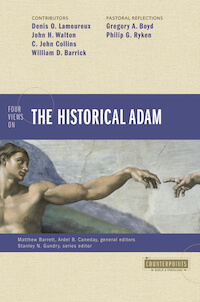Book Review: Four Views on the Historical Adam
Four Views on the Historical Adam
by Denis O. Lamoureux, John H. Walton, C. John Collins, William D. Barrick, Gregory A. Boyd, Philip G. Ryken
Review by Mark T. Witwer
Zondervan’s 32-volume Counterpoints series specializes in encouraging understanding and dialogue about topics on which Christians disagree. This volume tackles one of the most controversial faith and science discussions and does so with commendable clarity and charity.
After an introduction that serves as a short summary of the differing points of view, the book contains four chapters. In each, a contributor presents his view, the other contributors respond briefly, and then the first contributor offers a rejoinder. The book concludes with pastoral essays written by church leaders Gregory Boyd and Philip Ryken that explore differing implications of the views about historical Adam for everyday believers and congregations.
Each of the four essays answers the following questions:
What is the biblical case for your viewpoint, and how do you reconcile it both with modern science and with passages and potential interpretations that seem to counter it?
In what ways is your view more theologically consistent and coherent than other views?
What are the implications of your view for the spiritual life and public witness of the church and individual believers, and how is your view a healthier alternative for both?
Denis O. Lamoureux (Chapter 2: “No Historical Adam: Evolutionary Creation View”) shares his personal journey from atheism to young-earth creationism and then to accepting biological evolution after PhD work, first in theology and then in biology. Lamoureux believes God accommodated biblical revelation, delivering spiritual truths using “incidental ancient science,” such as creation of a fully formed original human. The story of Adam is an incidental vessel containing a divine message: “[Nature] reveals how God created us; [the Bible] discloses that He created us in His image and that we are all sinners.”
John H. Walton (Chapter 2: “A Historical Adam: Archetypal Creation View”) offers a view that might surprise many readers: Adam existed, but this fact is relatively unimportant to Adam’s biblical role. Making extensive use of the Bible and its cultural context, Walton argues that Adam and Eve were real people, but the Bible’s main interest in them is as archetypes of humanity’s representatives. Therefore, Genesis makes no claims about the material origin of humanity, with the implication that Adam and Eve may or may not have been the first humans.
C. John Collins (Chapter 3: “A Historical Adam: Old-Earth Creation View”) holds that Genesis is historical, but that we must be cautious not to be “too literalistic in our reading of Adam and Eve.” He argues that they were real individuals “at the headwaters of the human race,” but he is not specific about what this phrase truly means. This ambiguity in his position allows for deep Earth history and the possibility of humans before Adam. In spite of this perspective, Collins insists that any process God may have used to form mankind must be understood in light of the special creation described in the Book of Genesis: “It is simply unreasonable to suppose that one can arrive at human capacities without some ‘help from outside’…”
William D. Barrick (Chapter 4: “A Historical Adam: Young-Earth Creation View”) states that Genesis is an accurate historical record of creation, and also that Adam and Eve were specially created as the first human beings. Barrick exhorts Christians to accept what the biblical writers seemed to believe about creation. For example, “Characterization of the ancient world as riddled with pre-scientific error that God himself adopted in inspired Scripture impugns God’s moral integrity” and “The traditional viewpoint regarding the historicity of Adam chooses to stick primarily to the testimony of the biblical text.”
This Counterpoints book is a valuable resource for readers seeking to understand or help others understand why the topic of a historical Adam has become so controversial among Bible-believing Christians. Read the excellent introduction for an overview of the topic and a summary of the four outlined views.

